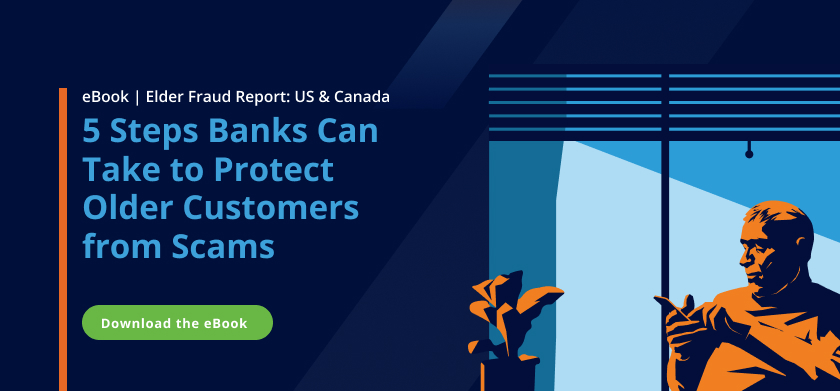Warning: Spoilers for the movie “Thelma” are contained in this article. The movie “Thelma” has a well-earned 99% score on Rotten Tomatoes. It's a heartfelt film (starring June Squibb) based on a true story about an elderly woman who, after getting scammed, embarks on a quest across Los Angeles with her friend Ben (Richard Roundtree) to get her money back.
Feedzai recently hosted a private movie screening for banking and fraud prevention community members in New York. After the movie, I chatted with attendees and got their reactions and impressions.
Clearly, “Thelma” struck a nerve with many people. Attendees shared their real-life tales of elder fraud experiences, how the ordeal impacted them, and the lengths they go to daily to protect their elderly loved ones.
We’ll share some of these stories, but first, here’s a rundown of what the “Thelma” movie gets right about elder fraud.
Many Elder Fraud Scams Start by Phone
The scam scene in “Thelma’ begins with a phone call. Thelma receives a call from an unknown number, with what sounds like her grandson Daniel on the other end, in great distress, telling her that he was in a car accident and passing the phone to a lawyer who needs $10,000 to keep him from going to jail.
The scene is an excellent depiction of how a grandparent scam works. Scammers prey on their victim’s fear and concern for their grandchild and send them into a state of panic. This fear is a powerful motivator and a key reason these scams are effective.
The true life story of Thelma happened before the age of generative AI and deepfakes. Today, these scams are extremely convincing, as the voice on the other end sounds precisely like their grandchild.
Cash is Still a Common Payment Method for Elder Scams
Following the scammers’ instructions, Thelma collects stacks of cash hidden around her home and puts it in the mail.
Ask a fraud fighter, and you will hear stories of an elderly customer coming into a branch with an empty shoebox that they fill with cash withdrawn from their accounts. For every story of a bank teller who skillfully and successfully convinces the elderly customer to stop, think, and call a loved one, many more follow through and lose their money.
Emotional Aftermath of Elder Scams
Realizing she has been tricked, Thelma goes through a range of emotions and reactions, which aligns with what many elder fraud victims experience. She feels shame, guilt, anger, dread, and a loss of confidence over getting tricked.
A Feedzai survey of elder fraud victims found most (81%) grappled with rage following their scam. Over a third (36%) said they felt shame. A quarter (24%) hid and never revealed their experience to friends or family.
Family Concerns Following Elder Fraud
The film skillfully demonstrates why many elderly fraud victims don’t want to tell their families they were scammed. Following the incident, Thelma overhears her family, including her daughter Gail (Parker Posey), son-in-law Alan (Clark Gregg), and Danny (Fred Hechinger), discussing whether she’s capable of caring for herself anymore.
An elder scam can trigger these challenging conversations among families about what’s best for the elderly relative. For some, it’s a point to consider moving their loved one to assisted living or getting power of attorney over their finances.
Real-life Stories of Elder Fraud
After the credits rolled, it became clear that “Thelma” had struck a chord with many attendees over their personal elder fraud experiences.
One attendee shared how they happened upon their loved one’s scam. After their grandparent fell ill, they began going through their financial records and learned that their loved one had been making regular payments as part of a romance scam. They were shocked at the discovery and at the complete lack of recourse for recovering any of the funds.
Another guest discussed how their parents fell victim to a scam and lost a significant sum. The most challenging part was when it became clear that their bank or the police could not help.
Stories like these are difficult enough, but another attendee revealed that their older loved one had fallen for scams on three separate occasions. This person is likely on a “sucker list” in which scammers continue to target them because they believe they can be tricked again and again.
How the ‘Thelma’ Movie Can Shift the Elder Fraud Conversation
“Thelma” is not the first Hollywood feature film depicting an elder scam, but the first to truly humanize and focus on the aftermath and impact on our elders and their loved ones. I hope this film further opens and expands an essential dialogue in our society about scams on the elderly and vulnerable.
It’s an opportunity for all of us to step up and advocate for protecting our most vulnerable citizens. The problem is universal and will require participation from banks, law enforcement, lawmakers, and many sectors of society.
Here are some critical lessons we suggest to keep our senior citizens safe.
Add Conversation with Family Members into Payment Approval
One idea being implemented to protect older customers is to prompt them to discuss high-value transactions with a family member first. Call center staff and tellers can communicate this directly, or automated messages can be sent during an interaction on the web or in-app. Customers can pause before they release their funds. Measures like this are an opportunity for banks to add additional security layer to protect their older customers.
Talk to Your Loved Ones About Elder Fraud
We must protect our loved ones as financial services, fraud professionals, and everyday people. Have these conversations before a crisis impacts your loved ones.
Hollywood’s value in making movies like “Thelma” is that they encourage essential discussions. Consider taking your grandma to see the film. Talk to your loved ones about how scams operate and what they should do if a scammer contacts them.
Educate Customers About Elder Fraud Threats
Banks can continue to invest in customer education about the scope of the threat, how to spot it, and how to report it. Educate your entire customer base about the threat—most of them have elderly family members—to get everyone involved in the effort and on the lookout for red flags.
Hollywood rarely creates a movie that is both heartwarming and topical. But the “Thelma” movie has done more than delight audiences. It has put elder fraud at the center of public discussion. Let’s take advantage of this opportunity to further the conversation, and keep our loved ones safe.
Share this article:
Lenny Gusel
Lenny Gusel is a distinguished leader with nearly two decades of expertise in the financial Fraud, Identity, and Authentication domains. His journey began as a product leader for NICE Actimize, where Lenny was at the forefront of digital banking fraud. He transitioned into strategic roles at Bank of America and JPMorgan Chase, to drive innovation and delivery for Fraud and Identity Platforms. Lenny was the Head of Fraud and Customer Trust & Safety for Robinhood Markets, and at a leading crypto exchange. He has been a strategic advisor to several leading vendors, and to product and operational teams within financial institutions. At Feedzai, Lenny’s focus is to enable and equip the financial industry with the tools and know-how to deliver safety and trust to their customers, and the agility and operating excellence required to manage identity and fraud risks in today’s world.
Related Posts
0 Comments4 Minutes
Feedzai’s AI Technology Earns Industry Recognition by Chartis
Feedzai, the world’s first RiskOps platform, has secured a pair of critical recognitions…
0 Comments6 Minutes
10 Fraud Prevention Tips for Businesses
Hopefully, you’ve had a chance to read Feedzai’s James Hunt’s insightful conversation…
0 Comments7 Minutes
Beyond the Face: Why Vietnam’s Banks Need Behavioral Biometrics to Fight the Rising Tide of Fraud
Financial transactions are increasingly virtual in today’s digital age, making fraud…

